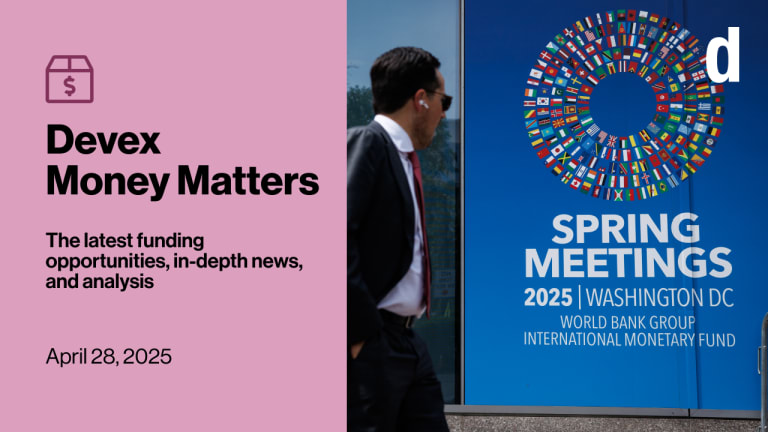
Last week saw two major events in the development calendar — the 75th World Health Assembly and Davos. We look at the results of both, and have a health funding analysis of our own.
+ Spread the word: Devex World is coming up on July 12, and from now to May 31, we are offering discounted tickets to attend in person in Washington, D.C., or virtually — with 12 months of Devex Pro subscription for free. Already a Pro subscriber? Feel free to share the news with colleagues to enjoy the offer.
WHO knows what
This is a preview of Devex Money Matters
Sign up to this weekly newsletter and get the latest in development funding in your inbox every Monday.
Last week’s WHA saw a number of major announcements. The reelection of Tedros Adhanom Ghebreyesus to lead the World Health Organization coincided with major changes to the agency’s funding model, to name just two.
Conducted against the backdrop of the war in Ukraine, WHA saw widespread condemnation of Russia’s aggression. There were also questions around vaccine equity, and demands for reform to prevent sexual exploitation, after stories that abuse was widespread during a recent Ebola epidemic in the Democratic Republic of Congo.
This week, we’ve stuck with the health theme for our funding data analysis. We look at the Bill & Melinda Gates Foundation, for which global health is one of the foremost themes, and pick out its biggest health grant recipients.
Gates Foundation: Top 10 health grant winners (Pro)
+ Save the date: On June 9 at 9 a.m. ET (3 p.m. CET), I’ll be talking to a panel of experts and business leaders from the world of global health supply chain. Devex Pro subscribers can register here. If you’re not a Pro subscriber yet, you can sign up for a free trial to join.
LMICs lead at Davos
A number of key themes emerged at Davos, including what IMF chief Kristalina Georgieva described as a “confluence of calamities” — climate, food, debt, war, pandemics, and inequality.
Leaders from low- and middle-income countries were quick to point out the inequalities of these calamities. Winnie Byanyima, the Ugandan executive director of UNAIDS talked about the entrenched racism in global development, while Pakistan’s minister of state for foreign affairs, Hina Rabbani Khar, laid the blame for the economic and humanitarian situation in Afghanistan at the feet of the international community.
My colleague Adva Saldinger has captured the feel of the discussions in the latest edition of Devex Invested. Check it out for all the details, and sign up to the newsletter to receive insights on how business, social enterprise, and development finance leaders are tackling global challenges.
Devex Invested: Davos amid a growing list of global ‘calamities’
+ Tune in to our podcast series Davos Dispatch to catch up on all the discussions at the World Economic Forum. The final episode is a wrap-up of the biggest takeaways from the meetings.
Funding activity
AICS. $2.7M (€2.5M) to support emergency nutrition activities in Sudan.
GAC. $8.6M (CA$11M) for humanitarian and development assistance in Ukraine.
JICA. $141M (¥18B) for disaster and climate change risk reduction and response in Vietnam.
USAID. $8M to assist people affected by Typhoon Rai and Tropical Storm Megi in the Philippines.
WB. $15M for transport and infrastructure resilience in Grenada.
See more funding opportunities.
Featured opportunity: AfDB approves $1.5B to tackle food crisis
The African Development Bank has launched a $1.5 billion African Emergency Food Production Facility to support smallholder farmers affected by food shortages caused by the war in Ukraine.
The facility will provide 20 million African smallholder farmers with certified seeds, increase their access to agricultural fertilizers, and enable them to rapidly produce 38 million tons of food.
Salary bands
What do we know about director-level salaries in development roles in the U.S.?
More and more is the answer. My colleague Raquel Alcega has been combing through our jobs database and found that the median annual salary is around the $125,000 mark, although there is plenty of variety, with the highest salary at around $365,000. Intergovernmental organizations pay the most, while local NGOs pay the least.
Salary transparency: What we know about globaldev director-level salaries (Career)
+ Interested in salary transparency and other globaldev career topics? We’d love your input: Fill out this short survey to provide your thoughts.
G’d aid
The bottom part of this bulletin has a strong Australian leaning. And indeed, you need to pronounce the header in a strong Australian accent to understand the rather weak pun it contains.
Anyway, the point is that after a decade of Liberal government, Australia has elected a Labor leader. And with this change we’ve seen an almost immediate swing toward more development funding.
So far there have been one-off commitments equivalent to almost 1 billion Australian dollars (over $700 million), but there’s likely more to come. And on top of the money, there is likely to be a more supportive policy environment. Lisa Cornish, reporting for Devex, has more details.
Australia: A new era for aid (Pro)
Palladium worth a lot of brass
An 80% stake in Palladium, the Australian development services company, has been bought by American investors Global Infrastructure Solutions Inc. for around $224 million.
Palladium has some 2,500 employees and works in 90 countries. It was previously majority owned by its chair, Kim Bredhauer, and CEO Chris Hirst.
Incidentally, I had a quick glance at the spot prices, and saw the deal makes Palladium worth about 4.7 metric tons of palladium.
Deal: Palladium sells majority stake for $224M (Pro)
Sign up to Money Matters for an inside look at the biggest stories in development funding.




